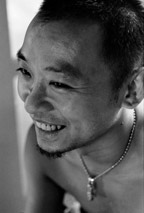Juror
Mickey Chen
 [Juror’s Statement]
[Juror’s Statement]
For more than a decade, from 1996—when I started making documentary films—to the present, I have been fortunate enough to experience this thriving age of creativity brought forth by numerous Taiwanese documentary-filmmaking colleagues. I myself have long worked in Taiwan’s queer-identity community, so this naturally made me sensitive to the many political changes, human rights campaigns, social movements, and other public issues that occurred in Taiwan during these years. We, as documentary filmmakers, have always asked ourselves what we should accomplish through our films.
I have always been an independent filmmaker and have never left the world of creative production. This has led me to focus on the complex array of elements that go into the creative process. From the struggle to claim one’s identity to the sensitivity toward creative forms, aesthetics, and language, to the deep, calm, yet energetic gaze we turn towards our works, akin to the focus of a marathon runner... making documentaries is an art. The goals we can strive for, using documentary films as artistic, narrative, and political forms of expression, are indeed infinite.
At this moment, I see that the field of documentary films is in a season of rich harvest. In this vast field there are diverse talents and countless voices which must use the medium of documentary film to be heard. Whether she or he, the filmmaker’s possibilities are abundant and are not limited by form or language. We can produce documentary films that make the audience flabbergasted, reflective, doubtful, or intoxicated with wonder.
| Mickey Chen Mickey Chen persistently makes documentaries on queer and gender issues in Taiwan. He also participates in street protests and believes that making documentaries can be an activist endeavor for social reform. He started shooting his first documentary, Not Simply a Wedding Banquet (1997), in 1996, and his works circulate in gay and lesbian, Asian-American, and international documentary film festivals. In 1999, his Boys for Beauty (YIDFF 1999) daringly went into theatrical release in Taipei to box-office success, and Chen won the Independent Spirit Award at the 1999 Taipei Film Festival. He then spent years investigating the murder of a boy who was bullied in junior high school in the south of Taiwan. In 2003, Memorandum on Happiness chronicled the dramatic break-up and surprising domestic violence between a lesbian couple. In 2005, Scars on Memory portrayed two tragic gay love stories. His latest piece, My Mother Lives in Queens, NY (2011), is the first part of his complex family story. |
